Reflection on Nursing Leadership: Integrating into Future Practice
VerifiedAdded on 2023/06/03
|8
|1780
|308
Essay
AI Summary
This essay is a reflection on a nursing student's experience during a placement in a rehabilitation healthcare unit, focusing on the leadership style of a senior registered nurse. The student uses the Gibbs Model of Reflection to analyze the situation, highlighting the negative impact of the senior nurse's autocratic leadership on the morale and productivity of student nurses. The essay discusses feelings of disrespect and demotivation, evaluating the poor leadership and its effects on patient care. It contrasts the autocratic style with transformational leadership, suggesting improvements for future leadership roles. The conclusion emphasizes the importance of effective communication, empathy, and emotional intelligence in nursing leadership. The essay includes an action plan for developing these skills through workshops, interviews, and research, aiming to cultivate a transformational leadership style. The student aims to avoid negative leadership traits and foster a supportive and productive work environment in their future nursing practice. The essay highlights how Desklib can help students with similar solved assignments and past papers.
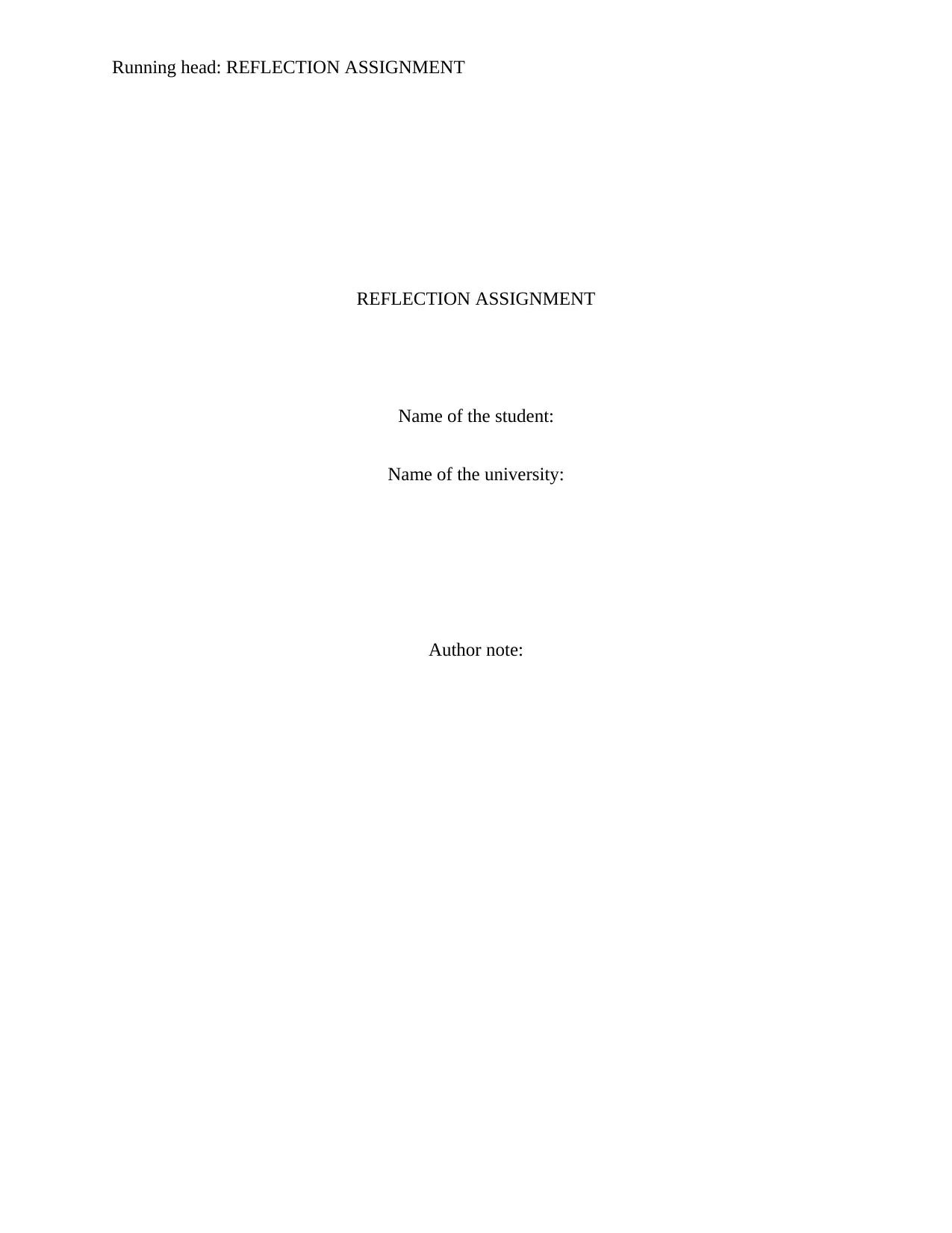
Running head: REFLECTION ASSIGNMENT
REFLECTION ASSIGNMENT
Name of the student:
Name of the university:
Author note:
REFLECTION ASSIGNMENT
Name of the student:
Name of the university:
Author note:
Paraphrase This Document
Need a fresh take? Get an instant paraphrase of this document with our AI Paraphraser
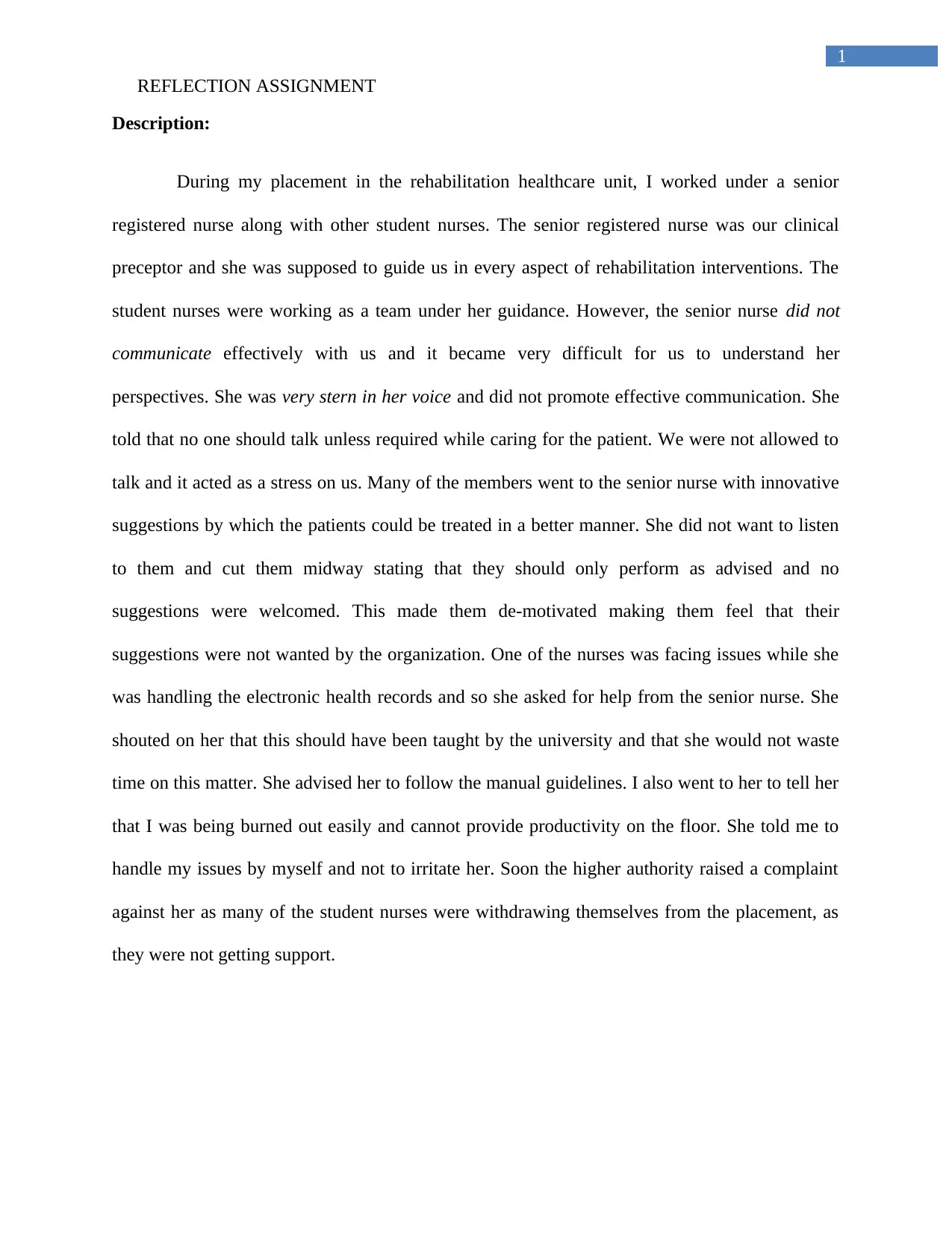
1
REFLECTION ASSIGNMENT
Description:
During my placement in the rehabilitation healthcare unit, I worked under a senior
registered nurse along with other student nurses. The senior registered nurse was our clinical
preceptor and she was supposed to guide us in every aspect of rehabilitation interventions. The
student nurses were working as a team under her guidance. However, the senior nurse did not
communicate effectively with us and it became very difficult for us to understand her
perspectives. She was very stern in her voice and did not promote effective communication. She
told that no one should talk unless required while caring for the patient. We were not allowed to
talk and it acted as a stress on us. Many of the members went to the senior nurse with innovative
suggestions by which the patients could be treated in a better manner. She did not want to listen
to them and cut them midway stating that they should only perform as advised and no
suggestions were welcomed. This made them de-motivated making them feel that their
suggestions were not wanted by the organization. One of the nurses was facing issues while she
was handling the electronic health records and so she asked for help from the senior nurse. She
shouted on her that this should have been taught by the university and that she would not waste
time on this matter. She advised her to follow the manual guidelines. I also went to her to tell her
that I was being burned out easily and cannot provide productivity on the floor. She told me to
handle my issues by myself and not to irritate her. Soon the higher authority raised a complaint
against her as many of the student nurses were withdrawing themselves from the placement, as
they were not getting support.
REFLECTION ASSIGNMENT
Description:
During my placement in the rehabilitation healthcare unit, I worked under a senior
registered nurse along with other student nurses. The senior registered nurse was our clinical
preceptor and she was supposed to guide us in every aspect of rehabilitation interventions. The
student nurses were working as a team under her guidance. However, the senior nurse did not
communicate effectively with us and it became very difficult for us to understand her
perspectives. She was very stern in her voice and did not promote effective communication. She
told that no one should talk unless required while caring for the patient. We were not allowed to
talk and it acted as a stress on us. Many of the members went to the senior nurse with innovative
suggestions by which the patients could be treated in a better manner. She did not want to listen
to them and cut them midway stating that they should only perform as advised and no
suggestions were welcomed. This made them de-motivated making them feel that their
suggestions were not wanted by the organization. One of the nurses was facing issues while she
was handling the electronic health records and so she asked for help from the senior nurse. She
shouted on her that this should have been taught by the university and that she would not waste
time on this matter. She advised her to follow the manual guidelines. I also went to her to tell her
that I was being burned out easily and cannot provide productivity on the floor. She told me to
handle my issues by myself and not to irritate her. Soon the higher authority raised a complaint
against her as many of the student nurses were withdrawing themselves from the placement, as
they were not getting support.
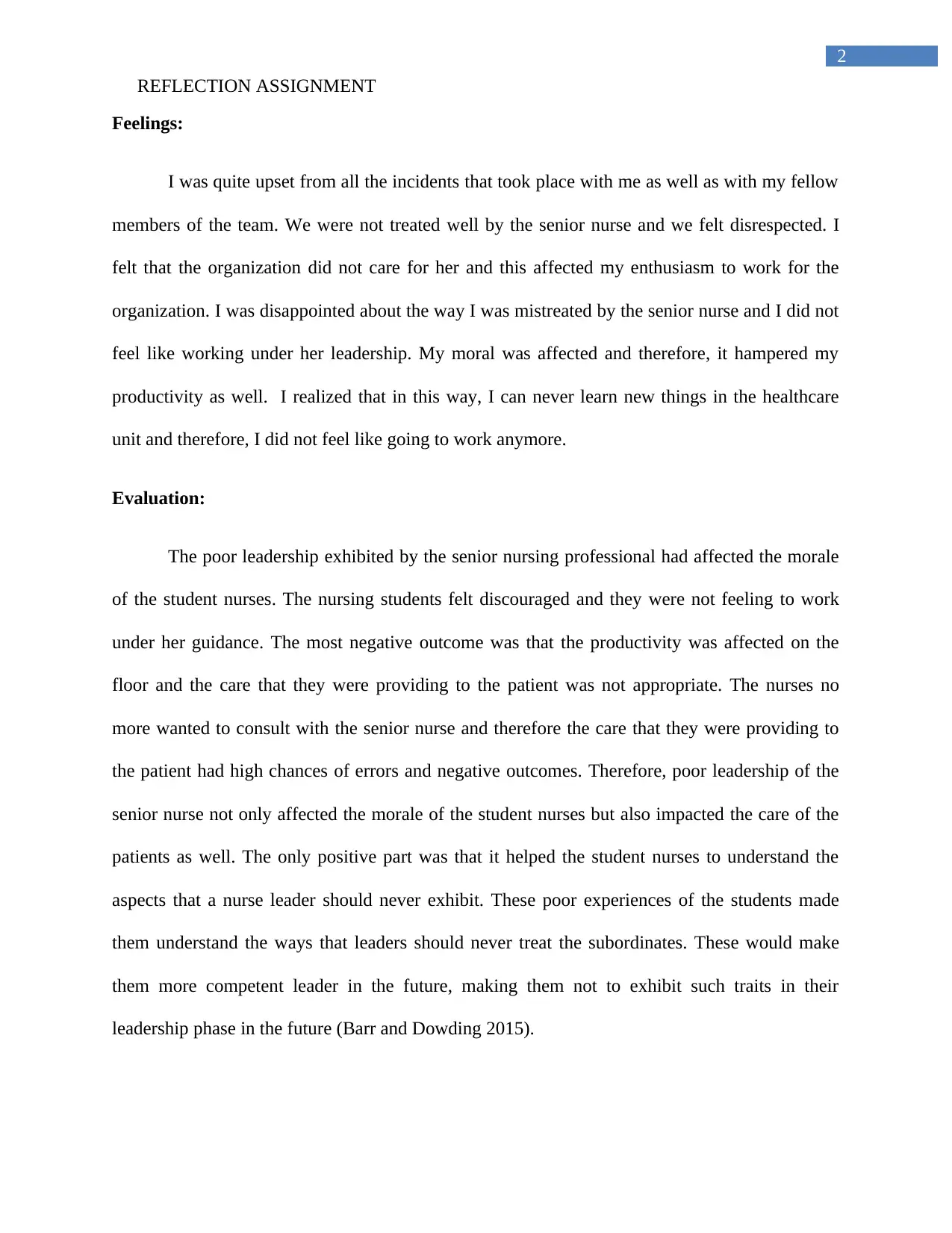
2
REFLECTION ASSIGNMENT
Feelings:
I was quite upset from all the incidents that took place with me as well as with my fellow
members of the team. We were not treated well by the senior nurse and we felt disrespected. I
felt that the organization did not care for her and this affected my enthusiasm to work for the
organization. I was disappointed about the way I was mistreated by the senior nurse and I did not
feel like working under her leadership. My moral was affected and therefore, it hampered my
productivity as well. I realized that in this way, I can never learn new things in the healthcare
unit and therefore, I did not feel like going to work anymore.
Evaluation:
The poor leadership exhibited by the senior nursing professional had affected the morale
of the student nurses. The nursing students felt discouraged and they were not feeling to work
under her guidance. The most negative outcome was that the productivity was affected on the
floor and the care that they were providing to the patient was not appropriate. The nurses no
more wanted to consult with the senior nurse and therefore the care that they were providing to
the patient had high chances of errors and negative outcomes. Therefore, poor leadership of the
senior nurse not only affected the morale of the student nurses but also impacted the care of the
patients as well. The only positive part was that it helped the student nurses to understand the
aspects that a nurse leader should never exhibit. These poor experiences of the students made
them understand the ways that leaders should never treat the subordinates. These would make
them more competent leader in the future, making them not to exhibit such traits in their
leadership phase in the future (Barr and Dowding 2015).
REFLECTION ASSIGNMENT
Feelings:
I was quite upset from all the incidents that took place with me as well as with my fellow
members of the team. We were not treated well by the senior nurse and we felt disrespected. I
felt that the organization did not care for her and this affected my enthusiasm to work for the
organization. I was disappointed about the way I was mistreated by the senior nurse and I did not
feel like working under her leadership. My moral was affected and therefore, it hampered my
productivity as well. I realized that in this way, I can never learn new things in the healthcare
unit and therefore, I did not feel like going to work anymore.
Evaluation:
The poor leadership exhibited by the senior nursing professional had affected the morale
of the student nurses. The nursing students felt discouraged and they were not feeling to work
under her guidance. The most negative outcome was that the productivity was affected on the
floor and the care that they were providing to the patient was not appropriate. The nurses no
more wanted to consult with the senior nurse and therefore the care that they were providing to
the patient had high chances of errors and negative outcomes. Therefore, poor leadership of the
senior nurse not only affected the morale of the student nurses but also impacted the care of the
patients as well. The only positive part was that it helped the student nurses to understand the
aspects that a nurse leader should never exhibit. These poor experiences of the students made
them understand the ways that leaders should never treat the subordinates. These would make
them more competent leader in the future, making them not to exhibit such traits in their
leadership phase in the future (Barr and Dowding 2015).
⊘ This is a preview!⊘
Do you want full access?
Subscribe today to unlock all pages.

Trusted by 1+ million students worldwide
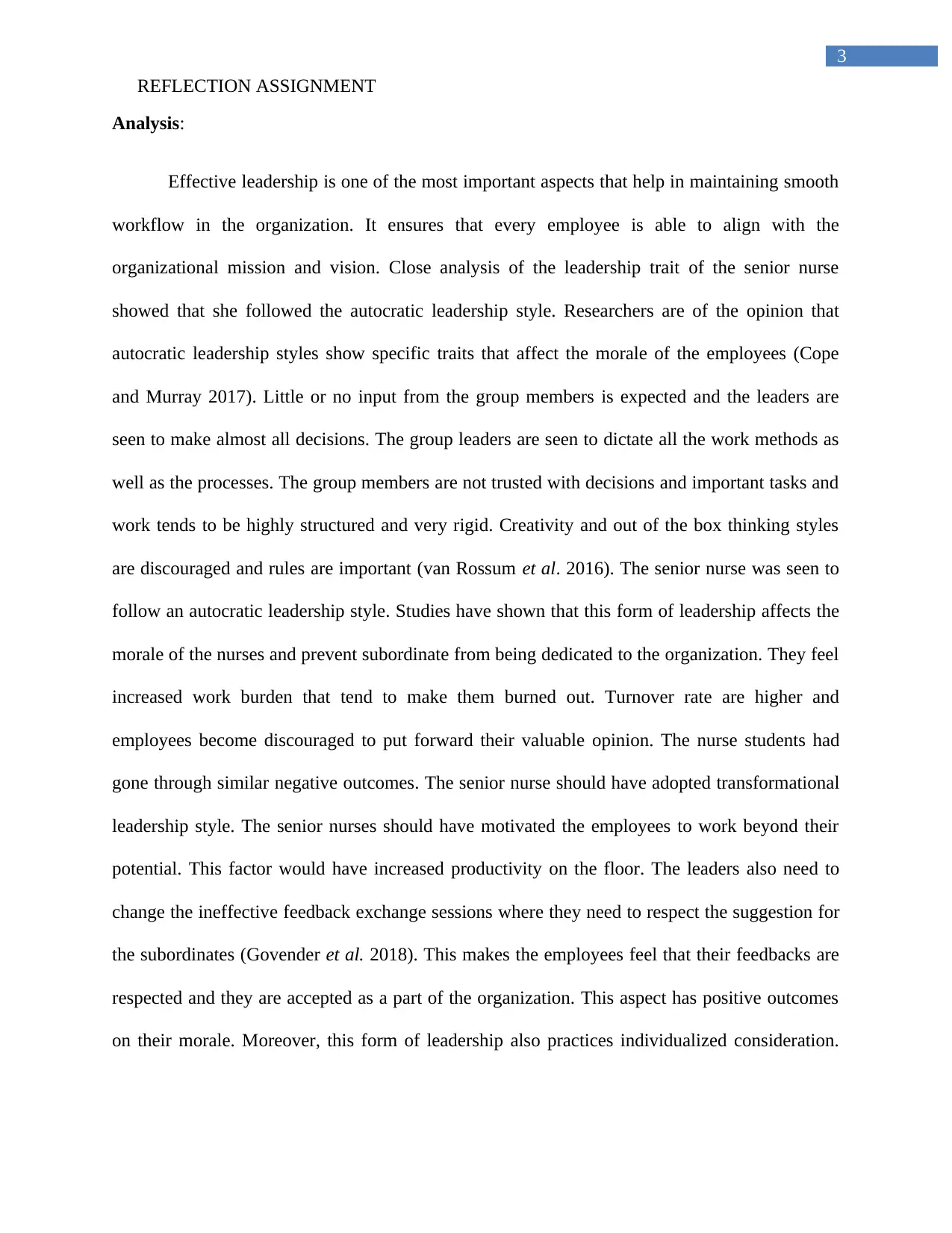
3
REFLECTION ASSIGNMENT
Analysis:
Effective leadership is one of the most important aspects that help in maintaining smooth
workflow in the organization. It ensures that every employee is able to align with the
organizational mission and vision. Close analysis of the leadership trait of the senior nurse
showed that she followed the autocratic leadership style. Researchers are of the opinion that
autocratic leadership styles show specific traits that affect the morale of the employees (Cope
and Murray 2017). Little or no input from the group members is expected and the leaders are
seen to make almost all decisions. The group leaders are seen to dictate all the work methods as
well as the processes. The group members are not trusted with decisions and important tasks and
work tends to be highly structured and very rigid. Creativity and out of the box thinking styles
are discouraged and rules are important (van Rossum et al. 2016). The senior nurse was seen to
follow an autocratic leadership style. Studies have shown that this form of leadership affects the
morale of the nurses and prevent subordinate from being dedicated to the organization. They feel
increased work burden that tend to make them burned out. Turnover rate are higher and
employees become discouraged to put forward their valuable opinion. The nurse students had
gone through similar negative outcomes. The senior nurse should have adopted transformational
leadership style. The senior nurses should have motivated the employees to work beyond their
potential. This factor would have increased productivity on the floor. The leaders also need to
change the ineffective feedback exchange sessions where they need to respect the suggestion for
the subordinates (Govender et al. 2018). This makes the employees feel that their feedbacks are
respected and they are accepted as a part of the organization. This aspect has positive outcomes
on their morale. Moreover, this form of leadership also practices individualized consideration.
REFLECTION ASSIGNMENT
Analysis:
Effective leadership is one of the most important aspects that help in maintaining smooth
workflow in the organization. It ensures that every employee is able to align with the
organizational mission and vision. Close analysis of the leadership trait of the senior nurse
showed that she followed the autocratic leadership style. Researchers are of the opinion that
autocratic leadership styles show specific traits that affect the morale of the employees (Cope
and Murray 2017). Little or no input from the group members is expected and the leaders are
seen to make almost all decisions. The group leaders are seen to dictate all the work methods as
well as the processes. The group members are not trusted with decisions and important tasks and
work tends to be highly structured and very rigid. Creativity and out of the box thinking styles
are discouraged and rules are important (van Rossum et al. 2016). The senior nurse was seen to
follow an autocratic leadership style. Studies have shown that this form of leadership affects the
morale of the nurses and prevent subordinate from being dedicated to the organization. They feel
increased work burden that tend to make them burned out. Turnover rate are higher and
employees become discouraged to put forward their valuable opinion. The nurse students had
gone through similar negative outcomes. The senior nurse should have adopted transformational
leadership style. The senior nurses should have motivated the employees to work beyond their
potential. This factor would have increased productivity on the floor. The leaders also need to
change the ineffective feedback exchange sessions where they need to respect the suggestion for
the subordinates (Govender et al. 2018). This makes the employees feel that their feedbacks are
respected and they are accepted as a part of the organization. This aspect has positive outcomes
on their morale. Moreover, this form of leadership also practices individualized consideration.
Paraphrase This Document
Need a fresh take? Get an instant paraphrase of this document with our AI Paraphraser
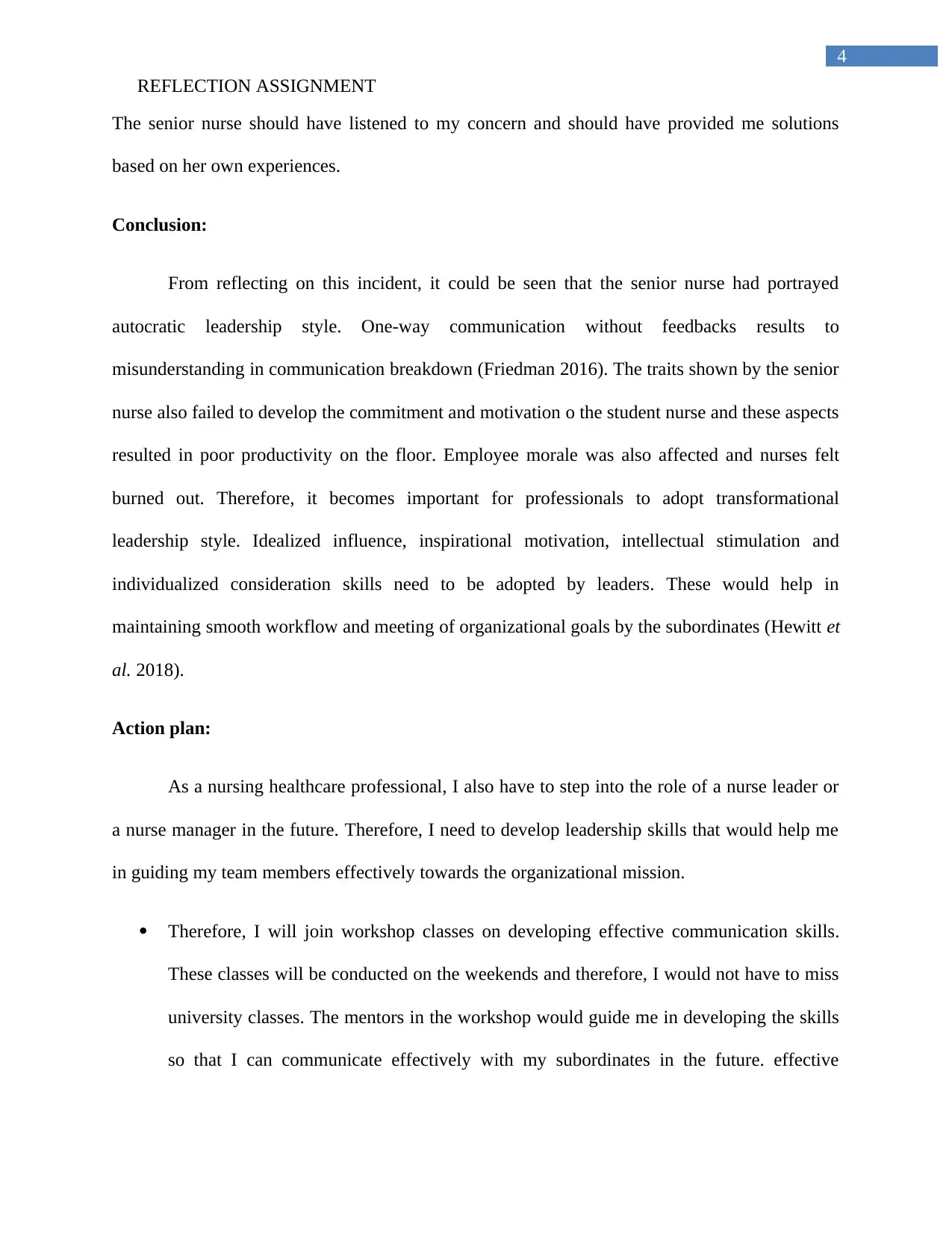
4
REFLECTION ASSIGNMENT
The senior nurse should have listened to my concern and should have provided me solutions
based on her own experiences.
Conclusion:
From reflecting on this incident, it could be seen that the senior nurse had portrayed
autocratic leadership style. One-way communication without feedbacks results to
misunderstanding in communication breakdown (Friedman 2016). The traits shown by the senior
nurse also failed to develop the commitment and motivation o the student nurse and these aspects
resulted in poor productivity on the floor. Employee morale was also affected and nurses felt
burned out. Therefore, it becomes important for professionals to adopt transformational
leadership style. Idealized influence, inspirational motivation, intellectual stimulation and
individualized consideration skills need to be adopted by leaders. These would help in
maintaining smooth workflow and meeting of organizational goals by the subordinates (Hewitt et
al. 2018).
Action plan:
As a nursing healthcare professional, I also have to step into the role of a nurse leader or
a nurse manager in the future. Therefore, I need to develop leadership skills that would help me
in guiding my team members effectively towards the organizational mission.
Therefore, I will join workshop classes on developing effective communication skills.
These classes will be conducted on the weekends and therefore, I would not have to miss
university classes. The mentors in the workshop would guide me in developing the skills
so that I can communicate effectively with my subordinates in the future. effective
REFLECTION ASSIGNMENT
The senior nurse should have listened to my concern and should have provided me solutions
based on her own experiences.
Conclusion:
From reflecting on this incident, it could be seen that the senior nurse had portrayed
autocratic leadership style. One-way communication without feedbacks results to
misunderstanding in communication breakdown (Friedman 2016). The traits shown by the senior
nurse also failed to develop the commitment and motivation o the student nurse and these aspects
resulted in poor productivity on the floor. Employee morale was also affected and nurses felt
burned out. Therefore, it becomes important for professionals to adopt transformational
leadership style. Idealized influence, inspirational motivation, intellectual stimulation and
individualized consideration skills need to be adopted by leaders. These would help in
maintaining smooth workflow and meeting of organizational goals by the subordinates (Hewitt et
al. 2018).
Action plan:
As a nursing healthcare professional, I also have to step into the role of a nurse leader or
a nurse manager in the future. Therefore, I need to develop leadership skills that would help me
in guiding my team members effectively towards the organizational mission.
Therefore, I will join workshop classes on developing effective communication skills.
These classes will be conducted on the weekends and therefore, I would not have to miss
university classes. The mentors in the workshop would guide me in developing the skills
so that I can communicate effectively with my subordinates in the future. effective
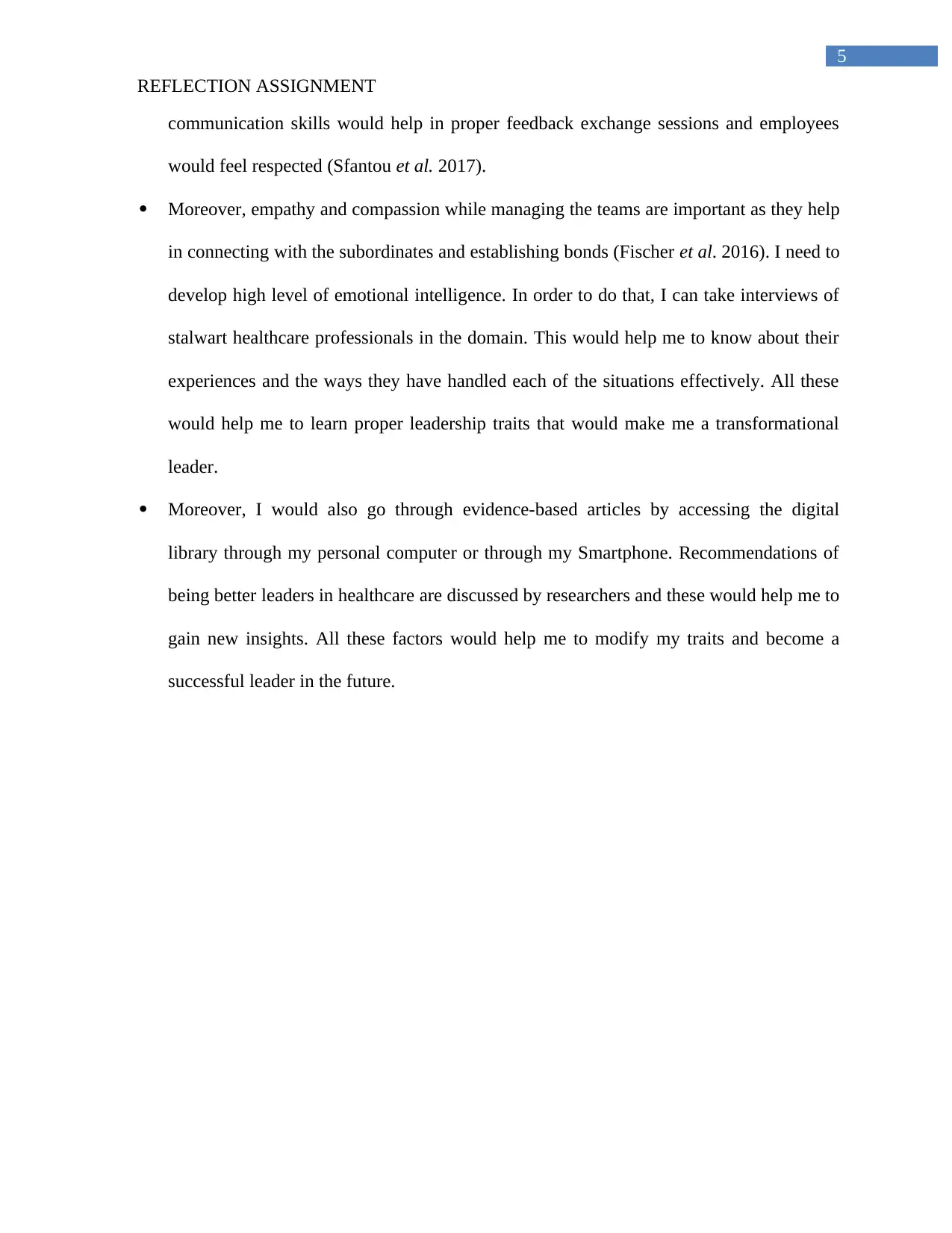
5
REFLECTION ASSIGNMENT
communication skills would help in proper feedback exchange sessions and employees
would feel respected (Sfantou et al. 2017).
Moreover, empathy and compassion while managing the teams are important as they help
in connecting with the subordinates and establishing bonds (Fischer et al. 2016). I need to
develop high level of emotional intelligence. In order to do that, I can take interviews of
stalwart healthcare professionals in the domain. This would help me to know about their
experiences and the ways they have handled each of the situations effectively. All these
would help me to learn proper leadership traits that would make me a transformational
leader.
Moreover, I would also go through evidence-based articles by accessing the digital
library through my personal computer or through my Smartphone. Recommendations of
being better leaders in healthcare are discussed by researchers and these would help me to
gain new insights. All these factors would help me to modify my traits and become a
successful leader in the future.
REFLECTION ASSIGNMENT
communication skills would help in proper feedback exchange sessions and employees
would feel respected (Sfantou et al. 2017).
Moreover, empathy and compassion while managing the teams are important as they help
in connecting with the subordinates and establishing bonds (Fischer et al. 2016). I need to
develop high level of emotional intelligence. In order to do that, I can take interviews of
stalwart healthcare professionals in the domain. This would help me to know about their
experiences and the ways they have handled each of the situations effectively. All these
would help me to learn proper leadership traits that would make me a transformational
leader.
Moreover, I would also go through evidence-based articles by accessing the digital
library through my personal computer or through my Smartphone. Recommendations of
being better leaders in healthcare are discussed by researchers and these would help me to
gain new insights. All these factors would help me to modify my traits and become a
successful leader in the future.
⊘ This is a preview!⊘
Do you want full access?
Subscribe today to unlock all pages.

Trusted by 1+ million students worldwide
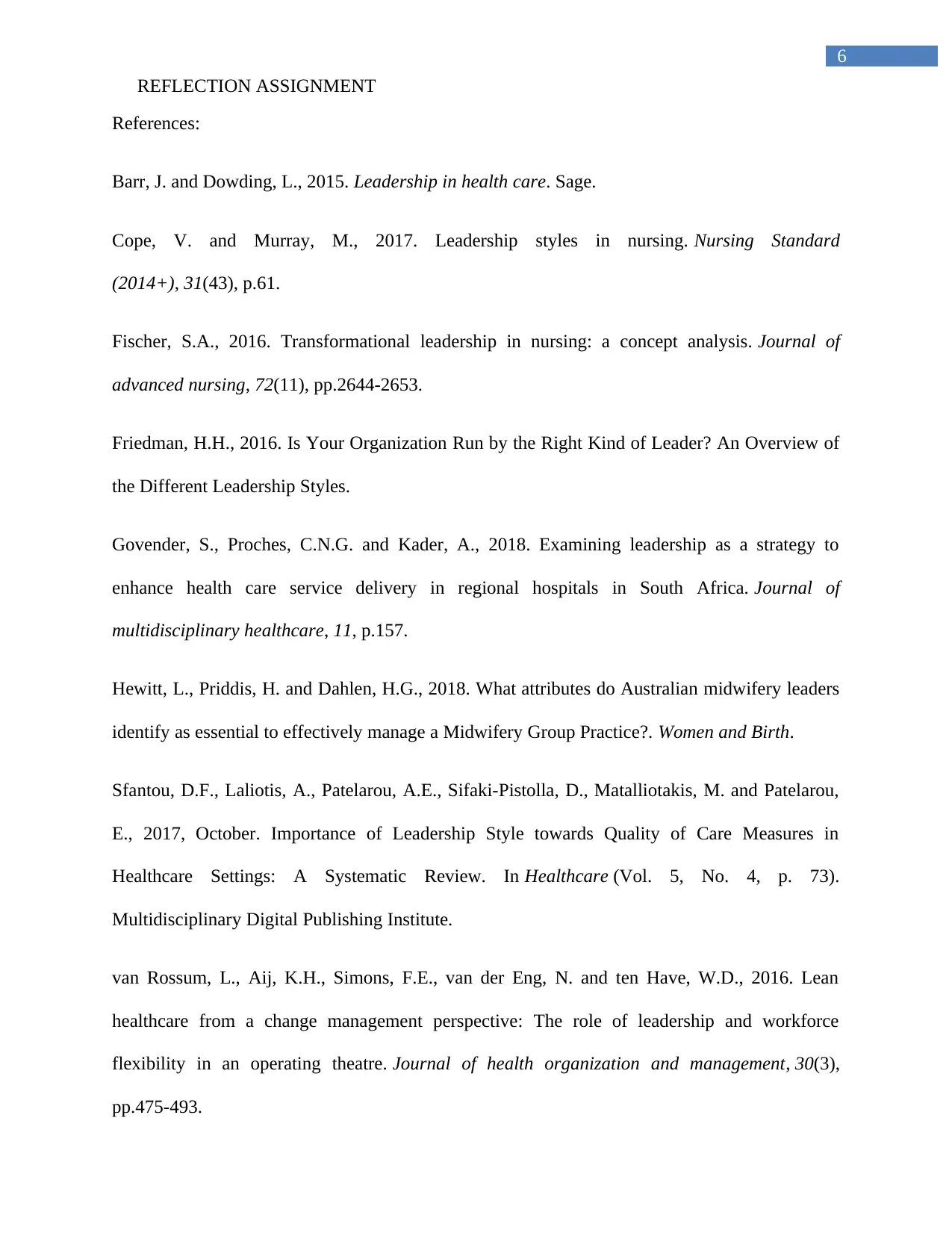
6
REFLECTION ASSIGNMENT
References:
Barr, J. and Dowding, L., 2015. Leadership in health care. Sage.
Cope, V. and Murray, M., 2017. Leadership styles in nursing. Nursing Standard
(2014+), 31(43), p.61.
Fischer, S.A., 2016. Transformational leadership in nursing: a concept analysis. Journal of
advanced nursing, 72(11), pp.2644-2653.
Friedman, H.H., 2016. Is Your Organization Run by the Right Kind of Leader? An Overview of
the Different Leadership Styles.
Govender, S., Proches, C.N.G. and Kader, A., 2018. Examining leadership as a strategy to
enhance health care service delivery in regional hospitals in South Africa. Journal of
multidisciplinary healthcare, 11, p.157.
Hewitt, L., Priddis, H. and Dahlen, H.G., 2018. What attributes do Australian midwifery leaders
identify as essential to effectively manage a Midwifery Group Practice?. Women and Birth.
Sfantou, D.F., Laliotis, A., Patelarou, A.E., Sifaki-Pistolla, D., Matalliotakis, M. and Patelarou,
E., 2017, October. Importance of Leadership Style towards Quality of Care Measures in
Healthcare Settings: A Systematic Review. In Healthcare (Vol. 5, No. 4, p. 73).
Multidisciplinary Digital Publishing Institute.
van Rossum, L., Aij, K.H., Simons, F.E., van der Eng, N. and ten Have, W.D., 2016. Lean
healthcare from a change management perspective: The role of leadership and workforce
flexibility in an operating theatre. Journal of health organization and management, 30(3),
pp.475-493.
REFLECTION ASSIGNMENT
References:
Barr, J. and Dowding, L., 2015. Leadership in health care. Sage.
Cope, V. and Murray, M., 2017. Leadership styles in nursing. Nursing Standard
(2014+), 31(43), p.61.
Fischer, S.A., 2016. Transformational leadership in nursing: a concept analysis. Journal of
advanced nursing, 72(11), pp.2644-2653.
Friedman, H.H., 2016. Is Your Organization Run by the Right Kind of Leader? An Overview of
the Different Leadership Styles.
Govender, S., Proches, C.N.G. and Kader, A., 2018. Examining leadership as a strategy to
enhance health care service delivery in regional hospitals in South Africa. Journal of
multidisciplinary healthcare, 11, p.157.
Hewitt, L., Priddis, H. and Dahlen, H.G., 2018. What attributes do Australian midwifery leaders
identify as essential to effectively manage a Midwifery Group Practice?. Women and Birth.
Sfantou, D.F., Laliotis, A., Patelarou, A.E., Sifaki-Pistolla, D., Matalliotakis, M. and Patelarou,
E., 2017, October. Importance of Leadership Style towards Quality of Care Measures in
Healthcare Settings: A Systematic Review. In Healthcare (Vol. 5, No. 4, p. 73).
Multidisciplinary Digital Publishing Institute.
van Rossum, L., Aij, K.H., Simons, F.E., van der Eng, N. and ten Have, W.D., 2016. Lean
healthcare from a change management perspective: The role of leadership and workforce
flexibility in an operating theatre. Journal of health organization and management, 30(3),
pp.475-493.
Paraphrase This Document
Need a fresh take? Get an instant paraphrase of this document with our AI Paraphraser
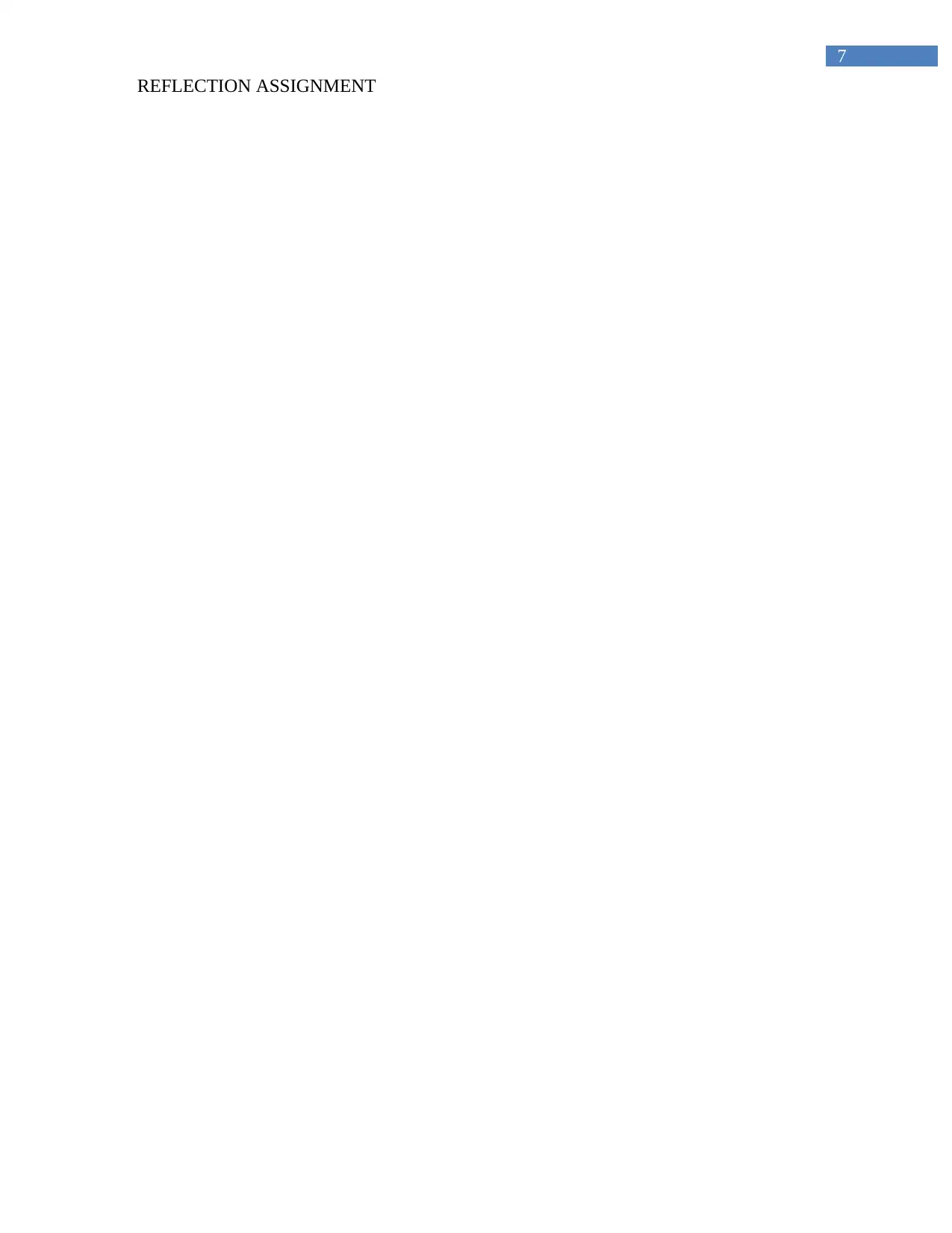
7
REFLECTION ASSIGNMENT
REFLECTION ASSIGNMENT
1 out of 8
Related Documents
Your All-in-One AI-Powered Toolkit for Academic Success.
+13062052269
info@desklib.com
Available 24*7 on WhatsApp / Email
![[object Object]](/_next/static/media/star-bottom.7253800d.svg)
Unlock your academic potential
Copyright © 2020–2025 A2Z Services. All Rights Reserved. Developed and managed by ZUCOL.





